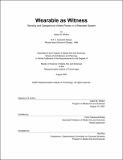Wearables as witness : sensing and categorizing violent forces in a wearable system
Author(s)
Whiton, Adam M. (Adam Michael)
DownloadFull printable version (1.390Mb)
Alternative title
Sensing and categorizing violent forces in a wearable system
Other Contributors
Massachusetts Institute of Technology. Dept. of Architecture. Program in Media Arts and Sciences.
Advisor
Chris Csikszentmihályi.
Terms of use
Metadata
Show full item recordAbstract
The societal problem of physical abuse persists in part because of isolation and concealment. Emerging technologies have been adapted by abusers for methods of control and by victims for methods of resistance. This project examines the intimate position wearable technologies have with our bodies and explores the design of a wearable computer system that could record and document physical forces to the body in an effort to quantify the physical abuse. The system could potentially assist the victims in the process of self-realization by confronting them with the cumulative history of their experienced abuse, while anonymous publishing of this information could lead to more supportive communities for them. The proposed system is in the form of apparel or smart clothing utilizing large area, fabric-based pressure sensors to categorize and measure the intensity and patterns of forces to the wearer's body. The work of this thesis is to develop and to characterize the use of the garment to assess what data it can provide. As textile-based user interfaces find their way into clothing, the opportunity for computers to identify physical abuse will become apparent. Although a computer system cannot understand the feeling of pain or the emotional suffering a victim feels, it should be aware of the presence of physical abuse for medical, legal or therapeutic reasons. This thesis will function both as a proof of concept and as a surveying stake to demonstrate a possible field of future investigation.
Description
Thesis (S.M.)--Massachusetts Institute of Technology, School of Architecture and Planning, Program in Media Arts and Sciences, 2007. This electronic version was submitted by the student author. The certified thesis is available in the Institute Archives and Special Collections. Includes bibliographical references (p. 62-65).
Date issued
2007Department
Program in Media Arts and Sciences (Massachusetts Institute of Technology)Publisher
Massachusetts Institute of Technology
Keywords
Architecture. Program in Media Arts and Sciences.